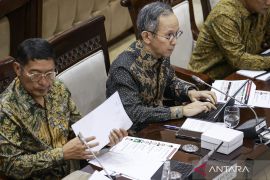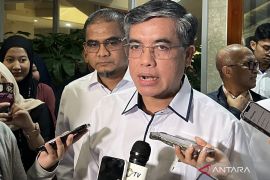Russia-Ukraina conflict that has a negative impact on global economic growth will impact and slow down economic recovery, particularly in emerging markets such as Indonesia.Jakarta (ANTARA) - The Russia-Ukraine conflict may slow down economic recovery in Indonesia and other developing countries, Institute for Development of Economics and Finance (INDEF) researcher Eisha M. Rachbini has predicted.
“The Russia-Ukraine conflict that has had a negative impact on global economic growth will impact and slow down economic recovery, particularly in emerging markets such as Indonesia,” she said in a written statement released hehere on Tuesday.
If the conflict gets drawn out, it may prompt several countries to ban imports of Russian commodities such as oil, nickel, aluminum, palladium, and wheat, and consequently, global commodity prices will increase, she projected.
Related news: DPR urges ministry prepare plan to evacuate Indonesians in Ukraine
A rise in global crude prices could increase the domestic prices of fuel oil and other essential commodities, including foodstuffs, she said.
"The government needs to exercise caution in responding to the crude oil and wheat price hike. It also needs to keep inflation under control by maintaining the stable domestic prices of fuel oil and foodstuffs and preventing them from becoming more volatile," she added.
The government's spending on energy subsidies may increase if the Russia-Ukraine conflict continues, she said. As a result, the state budget (APBN) may come under pressure, Rachbini added.
Related news: Ministry readies emergency travel documents for Indonesians in Ukraine
The energy subsidy skyrocketed by 347.2 percent to Rp10.42 trillion year-on-year in January 2022 compared to Rp2.3 trillion in January 2021, she noted.
"The consequence of counter-cyclical policy, for instance, by intervening in prices or providing subsidy, will put pressure on the budget deficit. Thus, the state budget needs to be managed efficiently by prioritizing economic growth and considering suspending the relocation of the capital city," she advised.
In connection with the US sanctions on Russian money market players and technological companies, coupled with potential for higher inflation, the Russia-Ukraine conflict may prompt the Fed to raise interest rates to a higher-than-expected level, she said.
"This may lead to the rupiah's depreciation, capital outflows, and a negative impact on the balance of payments (BoP). In the money market, conflict can also have an impact on credit distribution and corporate performance," she added.
Related news: Tourist visits jump 13.42% yoy in Jan: BPS
Related news: Tourism waste management requires comprehensive approach: ministry
Translator: Sanya Dinda S, Suharto
Editor: Fardah Assegaf
Copyright © ANTARA 2022











